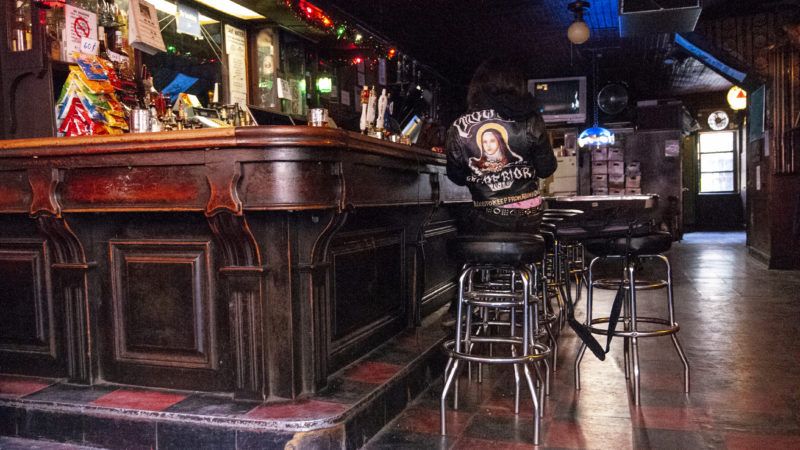Florida and Texas Close Their Bars In Response to Surge in New COVID-19 Cases
Rising rates of new cases and hospitalizations have seen both states' governors reverse course on reopening businesses.

Today, both Texas and Florida announced that they would be closing down their states' bars in response to a rise in the number of new coronavirus cases.
"It is clear that the rise in cases is largely driven by certain types of activities, including Texans congregating in bars," said Texas Gov. Greg Abbott (R) in a press release. "The actions in this executive order are essential to our mission to swiftly contain this virus and protect public health."
Bars in Texas were allowed to reopen May 22, provided they operated at 25 percent capacity. This was raised to 50 percent capacity in early June.
Abbott cited the state's positivity rate—meaning the percentage of coronavirus tests coming back positive—rising above 10 percent, and increasing numbers of COVID-19 patients in hospitals, as reasons for his reversal. The Texas Tribune reports that the state hit a record 4,736 hospitalizations on Thursday.
Hospitals in Houston and other metros report being at or near capacity. State officials and hospital leaders say Texas has enough intensive care unit (ICU) beds for now, but that new patients will outstrip hospital capacity if trends continue.
In addition to bars, Abbott's order closes rafting and tubing businesses—which were linked to an outbreak in Hays County—and requires restaurants to reduce their capacity from 75 percent to 50 percent.
It's a similar story in Florida, where rising case numbers and hospitalizations have seen Gov. Ron DeSantis (R) order that state's bars closed as well. The governor had previously allowed most bars in the state to open on June 3.
Florida's positivity rate has oscillated wildly from 5 percent to 18 percent over the past two weeks, but the trend has been unmistakably upwards.
Data collected by Florida International University (FIU) on South Florida hospitals, the Sun Sentinel reports, shows a surge in hospitalizations over the past two weeks, with places like Palm Beach and Miami-Dade County hitting record highs.
The FIU data shows more modest upticks in COVID-19 patients being admitted to ICUs or being placed on ventilators. "We are seeing slight spikes in ICU and ventilator use, and that's something to watch," Zoran Bursac, chair of FIU's Department of Biostatistics, told the Sun Sentinel.
Avik Roy of the Foundation for Research on Equal Opportunity noted on Twitter that Florida's rising hospitalizations are being driven mostly by younger people, who are less likely to need to be placed in ICUs and on ventilators.
The reason I'm walking you through all of this is because the recent rise in hospitalizations in Florida is driven by younger people. This appears to be true in Texas as well, though I don't think we have data sources in Texas that break out the distribution as well as Florida's.
— Avik Roy (@Avik) June 26, 2020
Former FDA head Scott Gottlieb notes more gravely that mortality rates for younger patients in Florida are unusually high.
https://twitter.com/ScottGottliebMD/status/1276584179988340737
Both The New York Times and the Los Angeles Times have run stories on the recent spike in new coronavirus cases among younger people, both of which emphasized the youth's trips to the bar as a reason for this uptick.
The temptation is obviously to blame these state's case spikes on hasty reopenings. A cross-state comparison complicates that picture somewhat.
Colorado, where bars serving primarily drinks were allowed to open at reduced capacity last week, is seeing a minor uptick in new cases. South Dakota, which never implemented a lockdown order, is seeing its number of new cases go down. Meanwhile, states like Washington are seeing a big spike in new cases despite bars remaining closed in most of the state, and indoor dining being allowed only at reduced capacity. Parts of Pennsylvania, which has also been slow to reopen, are seeing spikes in new cases as well.
Allegheny County reports *61* new cases of COVID-19. You have to go back two months, to the bad days of April, to find a number that high. Just 1 additional hosptialization and 2 new deaths reported today, but those are lagging indicators. Remains to be seen how they may change
— Chris Potter (@CPotterPgh) June 26, 2020
As always, the coronavirus pandemic continues to behave unpredictably, bedeviling efforts to find quick or simple policy responses.
Rent Free is a weekly newsletter from Christian Britschgi on urbanism and the fight for less regulation, more housing, more property rights, and more freedom in America's cities.

Show Comments (127)